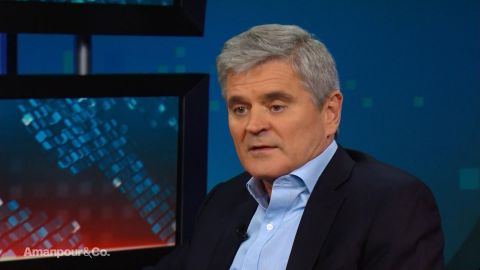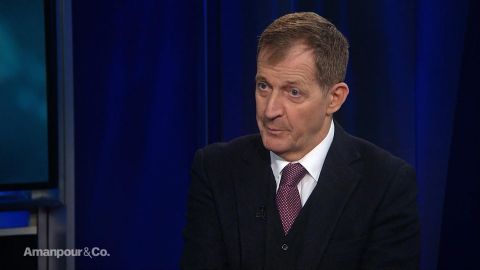Read Transcript EXPAND
AMANPOUR: Not so long ago just before you sat got here, you were sitting on that bench quite close to the prime minister, defending her, trying to give her some support. Why do you support this deal?
STEWART: I support the deal partly about national healing. So, this is an incredible divisive polarizing toxic issue now. If I go on social media at the moment, I almost can’t tell whether I’m being attacked by a remainer or an extreme Brexiteer, they’re both talking about having a monopoly of democracy, they represent the people, I’m a traitor, I’m never going to be forgiven. This kind of language can only we healed by a moderate pragmatic deal in the middle that acknowledges on the one hand the Brexit vote happened, and that means leaving the E.U., but also the point of the remainers, which is that this is economically very risky unless we retain a close trading relationship with Europe. And that’s what this deal does and it’s the only deal that does that.
AMANPOUR: So, you talk about sort of moderate. What do you call this? Would people call this a soft Brexit?
STEWART: I think you can call it anything you want. I think the important thing from the prime minister’s point of view is that it’s a bespoke Brexit. And that she — that is, in a sense, a victory for her negotiation because Europe said, “You can have Norway or you can have Canada.” What she’s actually got is something that’s better than Norway from the point of view of the fact she has control of immigration, which Norway doesn’t have, and better than Canada because she has a much, much closer trading relationship with Europe than would be available to Canada.
AMANPOUR: So, what I want to ask you is, do you really think it is the best deal possible or is there such a thing as a better deal than what we have now being in Europe? Last week you said to “Channel 4” that basically you were talking about it, as you said, it respects the results of the referendum, but it is going to be — I’m not arguing that it’s going to be a huge economic improvement, you know, which means that it might be worse. And in fact, we have findings, National Institute for Economic and Social Research has just come out with key findings that if the government’s proposed Brexit deal is implemented so the U.K. leaves the Customs Union and single market, then by 2030, GDP will be around 4 percent lower than it would have been had the U.K. stayed in the E.U. I mean, that’s pretty dramatic, isn’t it? I mean, do you — well, your commentary on that?
STEWART: Well, I think the first thing is that, they’re making a lot of assumptions there about the future relationship. So, they’re talking about leaving a single market, talking about the Customs Union and then they’re assuming what that future relationship will be, and we frankly don’t know yet. What we have is a head of terms agreement through the political agreement, which defines we want a very close working relationship with Europe. In the short-term, this deal is economically neutral. So, if you’re a car manufacturer, for example, we remain part of the single market effectively on goods. On the other hand, the advantage, so it’s economically revenue neutral, it’s to play for (ph) in the medium to long-term trading relationship. What is the long-term trading relationship? How does the British economy change? How does the European economy change? But it also does something that remaining in the European Union doesn’t do, which acknowledges that 17.6 million people, majority of people, voted to leave the European Union.
About This Episode EXPAND
Christiane Amanpour speaks with Justice Minister Rory Stewart and former British Labour Party Communications Dir. Alastair Campbell about Brexit; and Tena Clark about racial and political fault lines in the Deep South. Walter Isaacson speaks with Revolution CEO Steve Case, best known for co-founding AOL, about how to spread tech talent.
LEARN MORE



